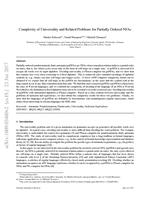Complexity of Universality and Related Problems for Partially Ordered NFAs
Aus International Center for Computational Logic
Complexity of Universality and Related Problems for Partially Ordered NFAs
Markus KrötzschMarkus Krötzsch, Tomáš MasopustTomáš Masopust, Michaël ThomazoMichaël Thomazo
Markus Krötzsch, Tomáš Masopust, Michaël Thomazo
Complexity of Universality and Related Problems for Partially Ordered NFAs
Information and Computation, 255(1):177-192, August 2017
Complexity of Universality and Related Problems for Partially Ordered NFAs
Information and Computation, 255(1):177-192, August 2017
- KurzfassungAbstract
Partially ordered nondeterministic finite automata (poNFAs) are NFAs whose transition relation induces a partial order on states, that is, for which cycles occur only in the form of self-loops on a single state. A poNFA is universal if it accepts all words over its input alphabet. Deciding universality is PSpace -complete for poNFAs, and we show that this remains true even when restricting to a fixed alphabet. This is nontrivial since standard encodings of alphabet symbols in, e.g., binary can turn self-loops into longer cycles. A lower coNP -complete complexity bound can be obtained if we require that all self-loops in the poNFA are deterministic, in the sense that the symbol read in the loop cannot occur in any other transition from that state. We find that such restricted poNFAs (rpoNFAs) characterize the class of R-trivial languages, and we establish the complexity of deciding if the language of an NFA is R-trivial. Nevertheless, the limitation to fixed alphabets turns out to be essential even in the restricted case: deciding universality of rpoNFAs with unbounded alphabets is PSpace -complete. Based on a close relation between universality and the problems of inclusion and equivalence, we also obtain the complexity results for these two problems. Finally, we show that the languages of rpoNFAs are definable by deterministic (one-unambiguous) regular expressions, which makes them interesting in schema languages for XML data. - Weitere Informationen unter:Further Information: Link
- Projekt:Project: Cfaed, DIAMOND, HAEC B08
- Forschungsgruppe:Research Group: Wissensbasierte SystemeKnowledge-Based Systems
@article{KMT2017,
author = {Markus Kr{\"{o}}tzsch and Tom{\'{a}}{\v{s}} Masopust and
Micha{\"{e}}l Thomazo},
title = {Complexity of Universality and Related Problems for Partially
Ordered {NFAs}},
journal = {Information and Computation},
volume = {255},
number = {1},
publisher = {Elsevier},
year = {2017},
month = {August},
pages = {177-192},
doi = {10.1016/j.ic.2017.06.004}
}
